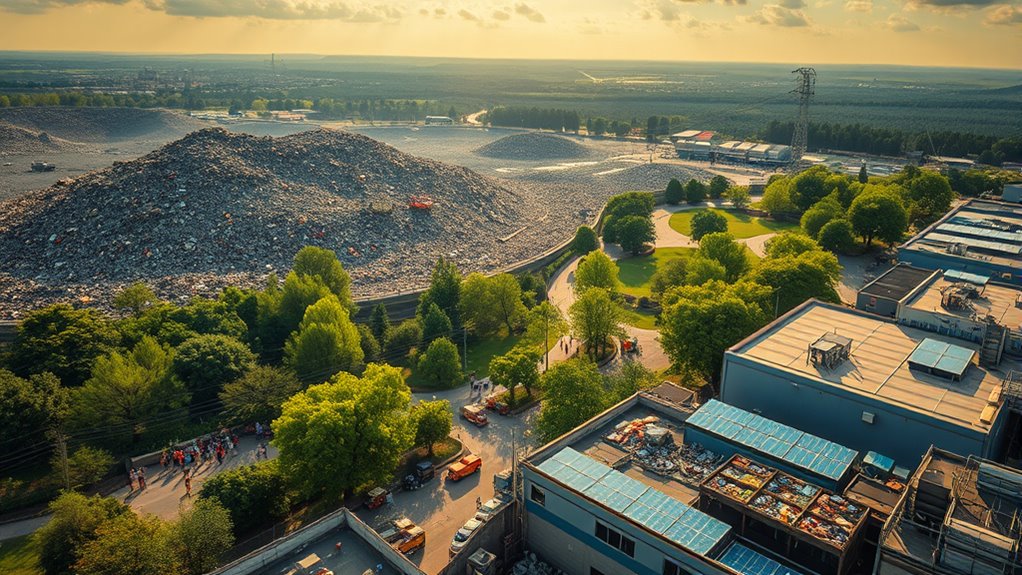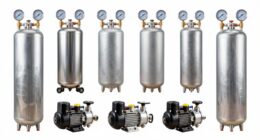Urban areas are grappling with skyrocketing waste generation, projected to triple by 2050. To combat this, cities must shift from traditional landfills to circular economy models that focus on waste reduction, recycling, and reusing materials. Innovative strategies, like smart waste systems, AI sorting technologies, and community engagement, are key. These approaches not only enhance efficiency but also foster sustainability. If you want to explore more about these transformative waste management practices, keep exploring this topic.
Key Takeaways
- Urban areas generate increasing amounts of waste, necessitating a shift from traditional landfill methods to sustainable circular economy practices.
- Implementing smart waste management systems can optimize collection routes and reduce emissions, enhancing efficiency and sustainability.
- Circular economy principles focus on reducing, reusing, and recycling materials to minimize waste and promote resource efficiency in urban settings.
- Community engagement and education are crucial for fostering public participation and understanding of effective waste management practices.
- Innovative technologies, such as AI and IoT, enhance waste sorting and collection processes, supporting the transition to more sustainable waste management models.
The Growing Challenge of Urban Waste Management
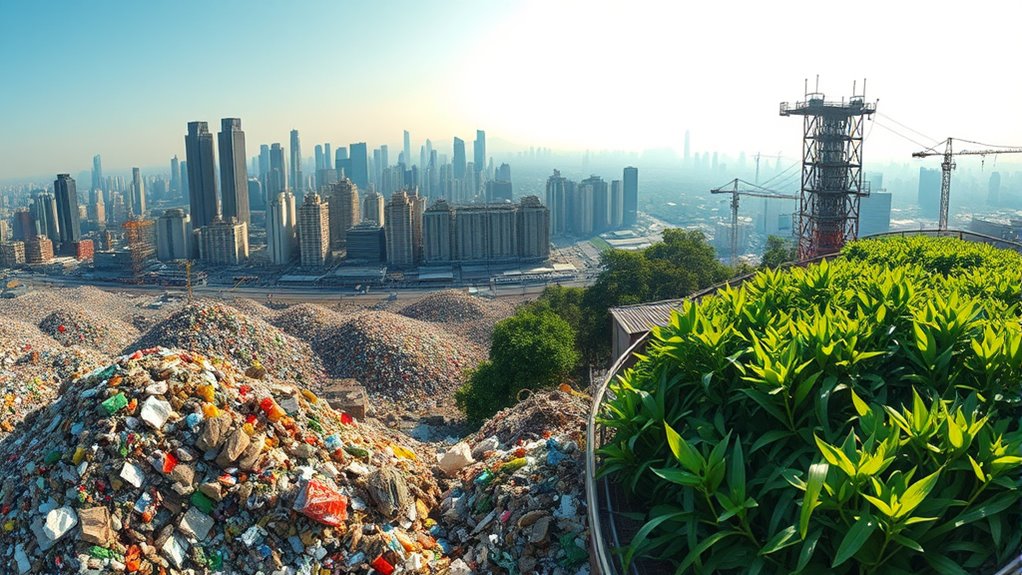
As urban areas continue to expand, the challenge of managing waste effectively grows more intimidating.
With the global municipal solid waste generation skyrocketing from 1.3 billion tons in 2012 to a projected 3.4 billion tons by 2050, cities are struggling to keep up. Rapid population growth exacerbates this issue; by 2025, the world population is expected to hit 8 billion, with 70% living in urban settings. Candy consumption contributes to the overall waste generated, particularly through packaging and single-use items. Additionally, implementing solar-powered solutions can help cities manage waste more sustainably by reducing reliance on fossil fuels and enhancing energy independence.
Your city likely faces insufficient waste collection facilities and outdated transportation methods, leading to overflowing bins and increased air pollution. Improper waste management leads to pollution and health issues, further complicating the urban waste crisis. Moreover, the lack of advance directives in urban planning can hinder effective resource allocation for waste management solutions.
With only 50-80% of waste collected in many developing countries, public health risks soar. You must recognize that tackling these challenges is essential for sustainable urban living and environmental health.
Innovative Strategies for Effective Waste Management
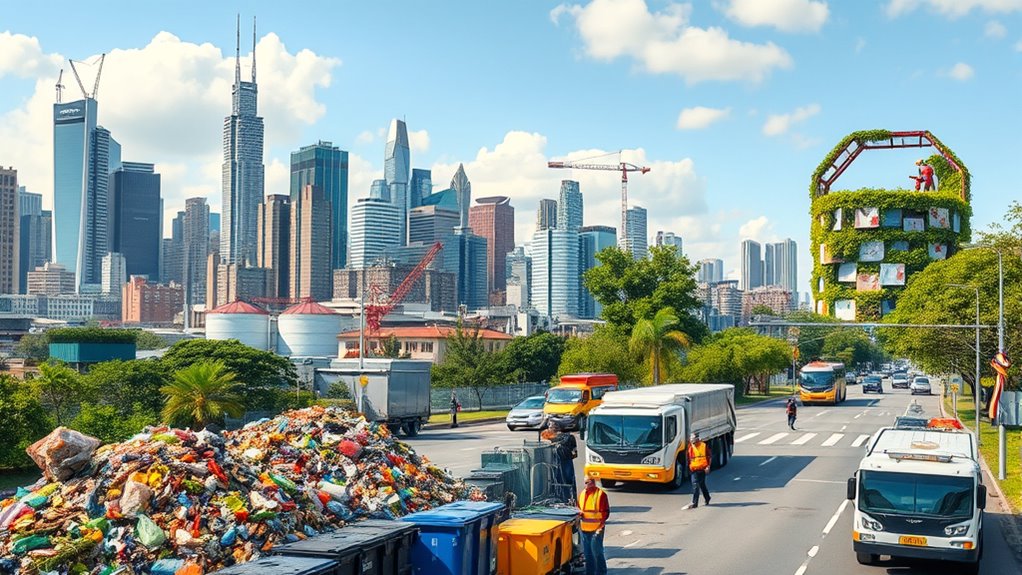
Cities are increasingly turning to innovative strategies to tackle the mounting waste management crisis. You might notice waste-to-energy plants converting trash into electricity, cutting reliance on fossil fuels. Smart waste systems use sensors for real-time monitoring, optimizing collection routes and reducing costs. Anaerobic digestion breaks down organic waste to produce biogas, while advanced composting techniques, like vermicomposting, efficiently manage leftovers. Furthermore, waste-to-energy technology is gaining traction in urban areas, providing a sustainable solution to landfill capacity issues. Pneumatic waste pipes minimize truck emissions by transporting waste directly to processing centers. By embracing decentralized approaches, communities engage in local waste management, fostering awareness and participation. These strategies are complemented by essential survival skills that empower individuals to manage waste effectively in their own homes, including knowledge of edible plants that can reduce food waste through foraging. Additionally, implementing eco-friendly practices can enhance the overall sustainability of waste management efforts. With regulatory frameworks supporting these technologies, cities can improve recycling rates and enhance overall waste handling efficiency. These strategies pave the way for a cleaner, more sustainable urban environment.
Embracing the Circular Economy in Urban Settings
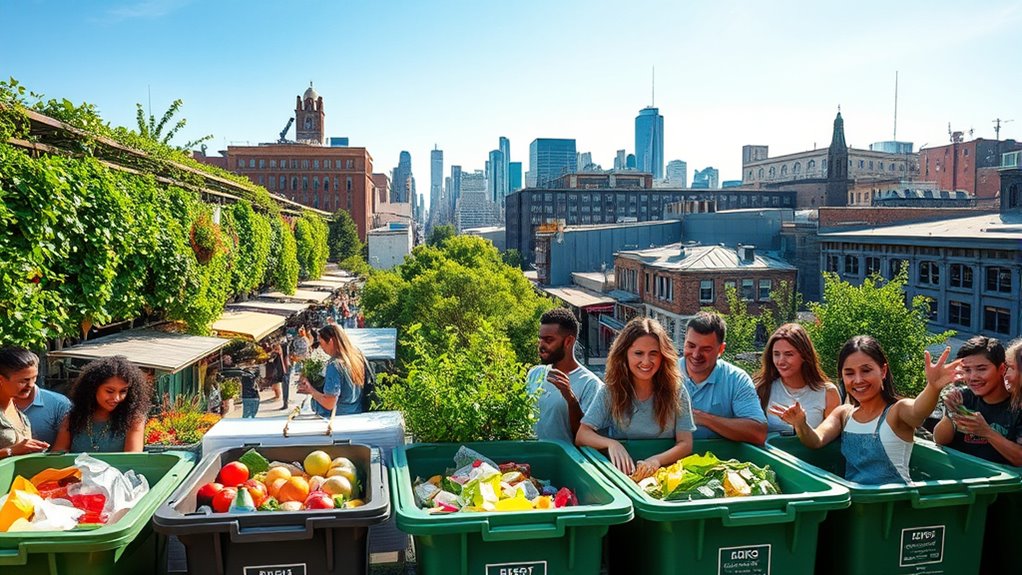
While urban areas face increasing waste management challenges, embracing the circular economy offers a transformative solution. By integrating circular principles, you can help eliminate waste and pollution in your city. Sound recording techniques can inspire innovative design approaches that prioritize sustainability and resource efficiency. Furthermore, adopting solar energy solutions can significantly reduce the carbon footprint of urban waste management processes. Additionally, incorporating freshly squeezed juices into community initiatives can promote healthier lifestyles while reducing waste from single-use packaging.
Collaboration among citizens, government, businesses, and research facilities is essential for success. Focus on designing products and services that are durable, adaptable, and locally sourced. Nature can inspire your designs, promoting sustainability. Circular economy programs emphasize the need for social equity, ensuring that marginalized groups benefit from sustainable initiatives.
You’ll find opportunities to enhance resource efficiency through strategies like reducing waste, reusing materials, and recycling. Technological innovations can streamline waste sorting and improve recycling processes.
The Impact of Urbanization on Waste Generation

Urbanization greatly influences waste generation, with rapid population growth and increased consumption patterns driving the volume of waste produced.
Cities worldwide produce 1.3 billion tonnes of solid waste annually, and by 2025, this figure is expected to rise to 2.2 billion tonnes. Higher population density and economic growth lead to greater waste production, particularly in low-income countries facing significant management challenges. Over half of the world’s population lives in cities, further exacerbating the waste issue. The reliance on wood-burning in some urban areas can also contribute to increased waste and pollution levels. Additionally, the increasing popularity of clean beauty products can lead to more packaging waste as consumers seek eco-friendly options. Implementing effective budgeting strategies for waste management is crucial for cities to adapt to these growing challenges.
As you navigate urban environments, municipal solid waste, wastewater, and greenhouse gas emissions become pressing concerns. The diverse composition of waste complicates recycling efforts, while inadequate infrastructure hampers effective management.
Public awareness is essential, as improper waste disposal affects public health and environmental sustainability, emphasizing the need for improved waste management strategies in growing urban areas.
Technological Advancements in Waste Management
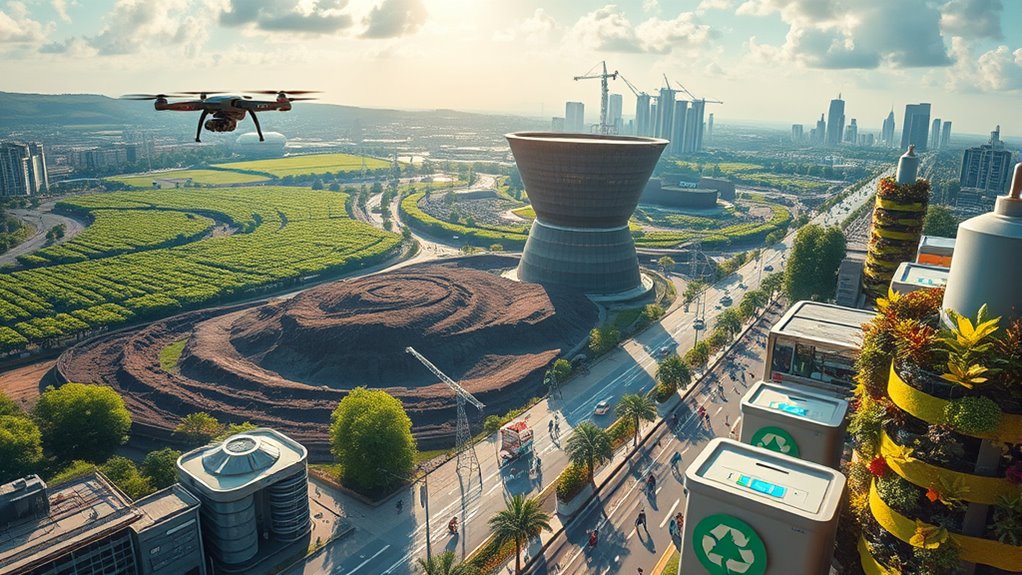
As technology evolves, waste management is becoming more efficient and effective in tackling the challenges of increasing waste generation. Innovations like AI and machine learning enhance sorting accuracy at recycling facilities, reducing contamination and improving recycling rates. Automated optical sorting systems quickly separate recyclables from non-recyclables, streamlining the process. Meanwhile, IoT-enabled waste bins monitor fill levels, optimizing collection routes and minimizing unnecessary pickups. Smart bins with fill-level sensors enhance real-time data collection and decision-making in waste management. Additionally, the integration of AI tools in waste management systems allows for predictive analytics, helping municipalities forecast waste generation trends and allocate resources more effectively. Understanding energy consumption patterns can also aid in planning efficient waste collection schedules. Furthermore, advancements in automation technologies enable businesses involved in waste management to improve overall operational efficiency and reduce costs. Route optimization software further reduces fuel consumption, making waste collection more sustainable. Waste-to-energy technologies turn non-recyclable waste into renewable energy, supporting circular economy goals.
Successful Models of Urban Waste Management
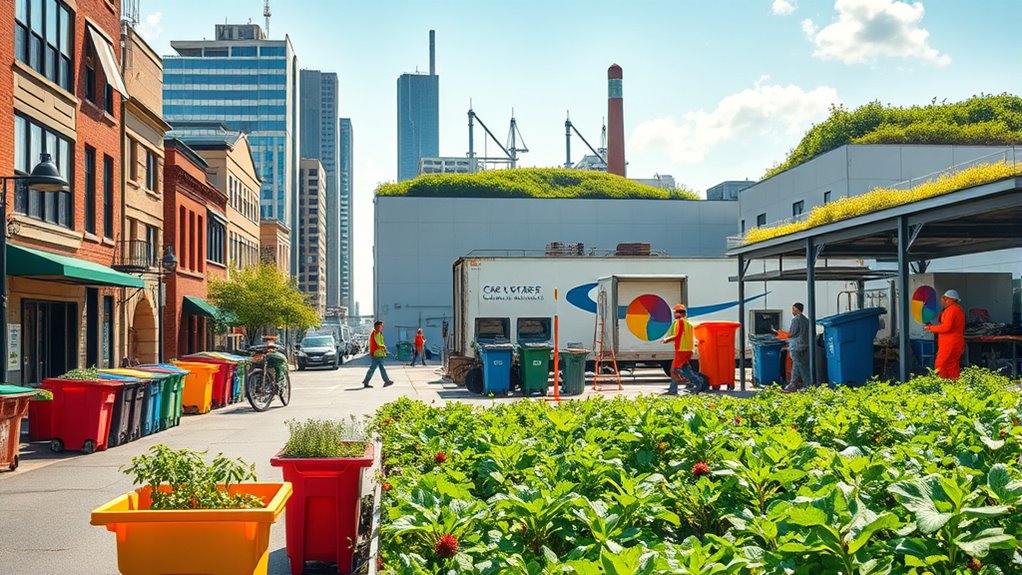
Innovative technology has paved the way for more effective waste management strategies in urban areas, but successful models go beyond just tech solutions. For instance, programs like “Pila Verde” in Santiago incentivize citizen participation by rewarding waste separation with symbolic currency. Formalizing informal waste collectors is also essential for integrating all community members into effective waste management practices. Additionally, effective customer feedback mechanisms are crucial for refining these initiatives based on community needs. Adaptive regulatory frameworks in cities like Mexico City enforce circular economy principles, while local cooperatives in Pune educate communities on waste segregation. Robust infrastructure investments guarantee effective waste collection and treatment, promoting resource recovery. In this context, high fiber content in certain biodegradable materials can enhance composting efforts, ultimately supporting a circular economy. Additionally, the integration of mindfulness practices into community education programs can improve residents’ understanding of waste management and its impact on the environment. Stakeholder collaboration in cities like Milan and Oakland fosters a unified approach.
Future Directions for Sustainable Waste Practices
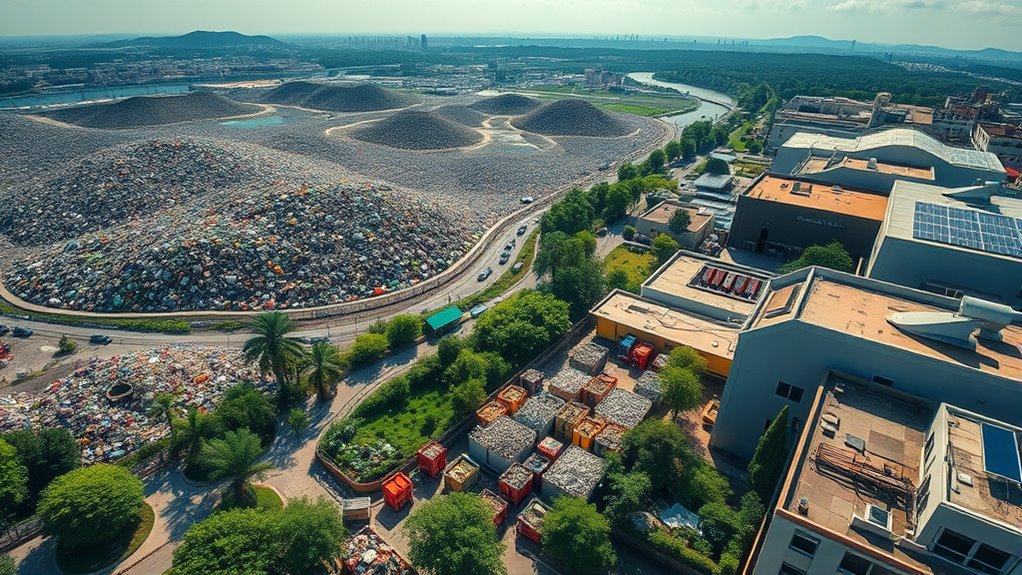
While many cities have made strides in waste management, the future lies in embracing sustainable practices that are both innovative and inclusive.
Smart waste management systems will help you optimize collection routes, cutting fuel use and emissions. By integrating AI, you can enhance recycling efficiency through accurate waste sorting. Additionally, utilizing sensors and data analytics can further streamline waste collection processes, ensuring that resources are used effectively. Moreover, the adoption of renewable energy technologies can further support the transition towards sustainable waste practices, including heat pumps that utilize renewable energy for efficient waste processing.
Waste-to-energy technologies transform organic waste into renewable energy, reducing landfill reliance. Robotics can further improve sorting accuracy, minimizing risks for workers.
Embracing circular economy principles means promoting resource reuse and recycling, encouraging public participation, and implementing closed-loop systems.
With strong policies supporting these initiatives, you’ll see reduced emissions, conserved land, and improved community engagement, all contributing to a cleaner, more sustainable urban environment.
Frequently Asked Questions
What Role Do Residents Play in Effective Waste Management?
You play an essential role in effective waste management by actively participating in waste segregation and recycling efforts.
By identifying recyclable materials and engaging in community initiatives, you help reduce landfill waste and promote resource conservation.
Educating yourself and others about sustainable practices encourages behavioral change, while using technology like smart bins can enhance sorting accuracy.
Your involvement fosters a sense of ownership, making a positive impact on the environment and your community.
How Can Businesses Contribute to Waste Reduction Efforts?
Businesses can be powerful players in waste reduction! Start by implementing recycling programs that identify recyclable materials and clearly label bins for better sorting.
Encourage eco-friendly practices like minimal packaging and reusable items. Engage employees through education and incentives, forming green teams to tackle waste issues.
Collaborate with suppliers and conduct regular audits to optimize operations. By taking these steps, you’ll greatly contribute to sustainable solutions and create a cleaner, greener environment.
What Are the Costs Associated With Implementing Smart Waste Technologies?
Implementing smart waste technologies comes with high initial costs, including sensor installation and data platform development.
While these investments can be substantial, they often lead to significant returns, sometimes within seven months.
You’ll also face ongoing operational and maintenance costs, but smart sensors can reduce collection expenses by optimizing routes.
Additionally, training your staff on new systems might incur extra costs, yet the efficiency gains typically outweigh these expenses over time.
How Can Communities Promote Awareness About Waste Management Issues?
Imagine a world where every piece of trash tells a story, urging you to listen.
To promote awareness about waste management, you can start by organizing community events that spark excitement and participation.
Collaborate with local schools to nurture young minds, using social media to amplify your message.
Incentives for recycling can turn chores into challenges, while hands-on workshops bring everyone together, transforming waste into a shared responsibility that brightens your community’s future.
What Are the Challenges of Enforcing Waste Management Regulations?
Enforcing waste management regulations poses several challenges.
You’ll find that the complexity of legal frameworks can confuse businesses, making compliance tough. Limited budgets often hinder effective enforcement, leading to fewer inspections.
Additionally, public awareness about proper waste disposal is generally low, causing unintentional violations. Rapid urbanization also strains existing infrastructure, while outdated technologies further complicate monitoring.
Encouraging public participation and education initiatives can help bridge these gaps and promote better compliance.
Conclusion
As urban areas continue to swell like a balloon, effective waste management is more essential than ever. By embracing innovative strategies and the principles of a circular economy, you can turn waste from a burden into a resource. Imagine transforming discarded materials into valuable assets, breathing new life into your community. Together, you can build a sustainable future, ensuring that the growing challenge of urban waste becomes an opportunity for positive change rather than a looming threat.
